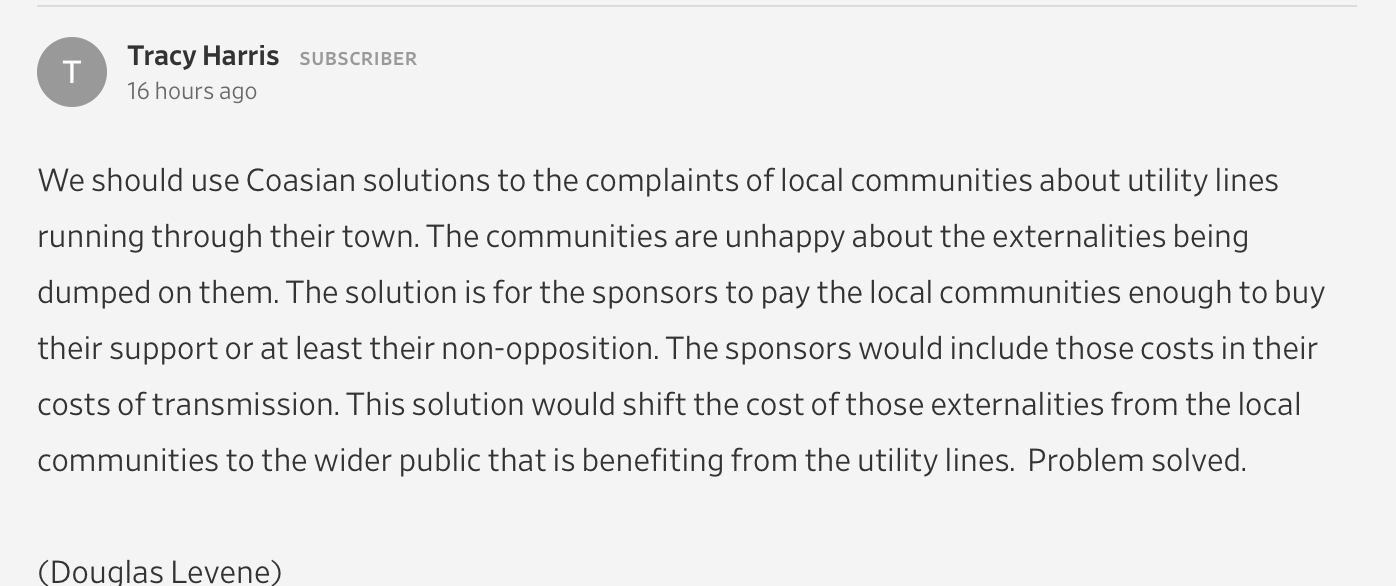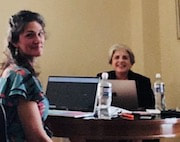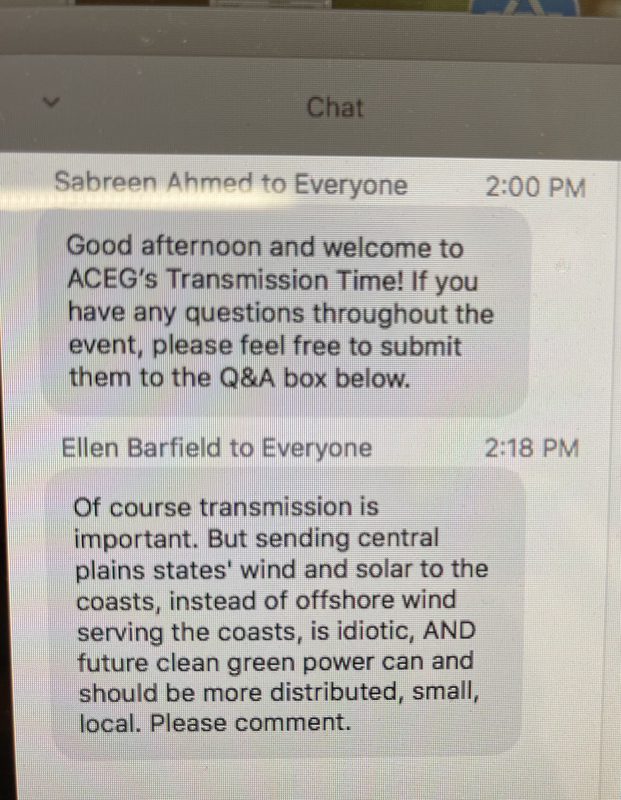Case in point: The Wall Street Journal.
How in the world did the mighty fall so far?
It looks like WSJ hired a bunch of biased and uniformed energy reporters with a political agenda. Not really surprising, based on the history, but it's actually getting worse!
These two political hacks masquerading as reporters think that Joe Biden can do something to speed up electric transmission permitting and siting.
No, he can't. Adding new layers of government control SLOWS things down, it does not speed them up. But never-you-mind, these two gals believe!
The changes—which include giving the federal government more authority to intervene in state-level permitting decisions—are meant to expedite the approval of new transmission lines, which often encounter regional opposition and face years of delays.
Here's reality: This is NOT a new process. It's one that became law back in 2005. What is new is a change to the wording of the statute that supposedly gives FERC the authority to site (and grant federal eminent domain authority) for a transmission line that is denied a permit by a state utility commission. The old law only gave FERC authority if a state failed to act on a permit application.
There's also a whole lot more to this process, such as a congestion study and designation of NIETCs. This MUST happen first because the only transmission projects eligible for federal usurpation of state authority must be in a NIETC. Even with a NIETC designation, the state process must play out before it could bump to FERC. Also, add years of rulemakings and governmental bureaucracy (environmental reviews) to the mix. And, does Congress actually have the authority to claim a role in electric transmission siting? Our Constitution says the feds can't step into an area that was left to the states. Add years of court challenges to this list. Why didn't the reporter mention ANY of this?
You know, the whining of developers should have tipped a reporter off that there was more to this picture.
Developers expect the new measures to streamline approvals but say they might not be enough. Companies proposing transmission lines say they often face local opposition, protracted state-level study processes or pushback from rival companies that don’t want new sources of electricity coming into regional markets.
“You look at the history in the U.S., and it’s very tough,” said Mike Garland, chief executive of transmission and renewables developer Pattern Energy Group, which recently started operating a 155-mile transmission line in New Mexico that took about seven years to finish.
“A couple of people can stop a transmission line, and that’s really bad news,” Mr. Garland said. “For us, the infrastructure bill provides a number of benefits that can help. It doesn’t solve the problem.”
Rob Gramlich, founder and president of power-sector consulting firm Grid Strategies LLC and executive director of advocacy group Americans for a Clean Energy Grid, said the Energy Department’s expanded ability to resolve and perhaps override state-level decisions could have a significant effect on efforts to expedite projects. But he said it remains unclear how the agency would use the new tools.
“It may just be the big stick they carry around while speaking softly in these regional transmission efforts and state siting proceedings,” Mr. Gramlich said. “But when everybody knows that stick exists, their behavior might change.”
But let's get back to Mike Garland and his affront that a couple of people can stop a transmission line. Ya know what, Mike? There's a really simple solution to your problem. If you bury your transmission line on an existing right-of-way, nobody is even going to want to stop your project in the first place!! It's a miracle! Maybe if Mike quits trying to take land from other people upon which to build his profit-making power line, we could make some real progress here. No sticks, no made up propaganda, no reporter bullshit needed.
And where did the reporter get this notion?
Critics of transmission projects over the years have cited various concerns including the use of eminent domain, environmental impacts and potential effects on property values, among other factors.
This whole article is full of derogatory presumptions, such as bringing up NIMBY, and blaming opposition on the fossil fuel industry.
Transmission line projects often face pushback during the permitting process, including opposition from established power providers. Companies that own nuclear and fossil-fuel plants have raised concerns about their ability to compete with wind, solar or hydropower delivered from other markets.
Maine residents last month voted to reject a $950 million transmission line under construction by Spain’s Iberdrola SA that would carry Canadian hydropower into the New England market. NextEra Energy Inc., a power company that operates a nuclear plant and an oil-fueled power plant in Maine, donated about $20 million to a political-action committee opposing the project and was joined by several other companies with plants in the area.NextEra declined to comment. Avangrid Inc., the U.S. subsidiary of Iberdrola that is behind the project, is fighting the ballot measure in court.
“This is really about the transition from the old to the new, and how we manage that,” said Avangrid’s deputy chief executive, Bob Kump.
Some Maine residents also raised concerns about the project’s potential harm to state forests and questioned whether the developer overstated its environmental benefits.
Sandi Howard, a music professor and Registered Maine Guide who leads a grass-roots opposition group, said the removal of tree canopy could hurt tourism and pose environmental and wildlife harms, including disturbing deer wintering areas and hurting native brook trout.
“Sometimes people throw up NIMBY,” said Ms. Howard, referring to the acronym for “not in my backyard.” “It’s bigger than that.”
And let's talk about Bob Kump's assertion regarding what this is really about. Bob gets it wrong. What it IS about, at its very core, is money. Piles and piles of big green money! Kump and his company stand to get very, very rich if they can build a transmission line through rural Maine and pretend to sell "renewable" power to Massachusetts. It's always about the money.
The comments on this article are numerous. Perhaps the most infuriating is this one:
However, the comments overall seem to be telling the reporters the same thing... that Big Government is never the solution. In fact, it's more likely to be the problem.
Chris Miller, the council’s president, said he remains concerned that the federal government could override state-level decisions on transmission projects without having to consider alternatives with potentially less environmental impact.
“You’re basically taking state and local self-determination and exchanging it for the administrative fiat of FERC,” he said. “If your goal is to protect the environment, that is not acceptable.”
Some People oppose transmission, but Most People need new transmission.
Some People are rural.
Most People are urban.
Did the reporter actually count everyone to see which should be labeled "some" and which should be labeled "most"? How many is "some"? How many is "most"? Or are the words "some" and "most" propaganda words used to subliminally sway reader opinion? Doesn't look like it's working.
This article is nothing more than a bundle of glittering generalities that mean absolutely nothing at all. What a complete waste of time and effort. How about reporting the facts for a change and leaving the opinion on the editorial page? Shame on you Wall Street Journal!





 RSS Feed
RSS Feed